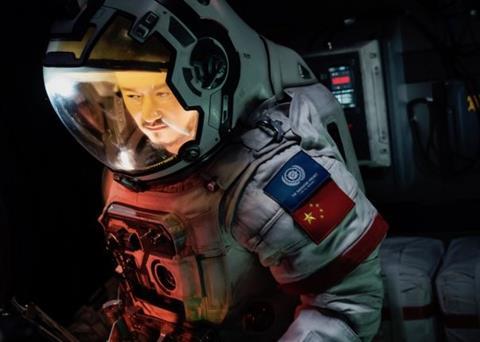China’s first big-budget science fiction film lifts off at lunar new year

Dir: Frant Gwo. China. 2019. 125 mins
Opening amidst a blizzard of coverage touting its status as China’s first big-budget science fiction film, The Wandering Earth is a commendably ambitious undertaking wherein the future of humanity is threatened by the sun dying out. China has dabbled in sci-fi cinema since Death Ray on Coral Island (1980) but the scale here is unprecedented locally with the reported $50 million budget clearly up on screen. Adapting a 2000 novel by Liu Cixin (credited as executive producer), director Frant Gwo pulls out all the stops to make The Wandering Earth a groundbreaking blockbuster. In doing so, though, he piles on life-threatening incidents and outpourings of emotion at such a rate that the result plays like a truncated mini-series.
A giant leap for China’s science fiction cinema but not for the genre itself
Domestically, the film should be one of the stronger lunar new year holiday performers as, aside from Liu’s ardent readership, it is set to capitalise on a growing local interest in sci-fi cinema cultivated through Hollywood imports. Science-based titles such as Gravity (2013), Interstellar (2014) and The Martian (2015) have been hugely popular in this unpredictable market, which bodes well for The Wandering Earth given it takes a similar approach, albeit with a heavy dose of Chinese sentiment. Curiosity value for genre buffs aside, this looks like being another expensive Chinese production that makes little impact internationally despite considerable hype.
It starts with a flurry of attention-grabbing exposition as the death of the sun requires Earth to move to a new solar system, a journey which will take 2,500 years and calls for the construction of 10,000 giant planet thrusters. As a result of abnormal weather conditions, society is forced to move underground while selfless astronauts such as Liu Peiqiang (Wu Jing) leave their families to travel aboard a space station that will serve as the planet’s guide.
Jumping forward 17 years, Liu’s son Liu Qi (Qu Chuxiao) is a rebellious young man living in a subterranean city. We only get a glimpse of how it functions before Liu Qi springs his adopted, gum-chewing sister Han Dao (Zhao Jinmai) from high school to go exploring on the surface. Their trip coincides with an engine failure that puts the Earth on a collusion course with Jupiter. Joining a group that includes military captain Wang Lei (Li Guangjie), soldier Zhou Qian (Jingjing Qu) and scientist Li Yiyi (Zhang Yichi), they have 37 hours to avert disaster with Liu Qi’s father providing radio assistance.
Although the film’s publicity materials have emphasised its outer space elements, much of the action takes place on a treacherous Earth. Production designer Gao Ang has created an expansive wasteland which recalls The Day After Tomorrow (2004) and Snowpiercer (2013), but exerts its own prophetic power. The future centre of Beijing is chillingly rendered (watch out for the infamous CCTV tower) while one of the most exhilarating action scenes involves heavy-duty vehicles barreling through huge clunks of falling ice with no signs whatsoever that it was shot on a soundstage. Sadly, as Cheung Ka-Fai’s editing keeps things moving at such a rapid clip, it becomes a challenge to appreciate the technical achievements on display.
As much as the hurried storytelling covers a lot of ground in two hours, the film also has a mile-wide sentimental streak. Unfortunately for a film that extolls the necessity of hope, the human element is less than compelling as characters who should be defined by focused action or technical expertise are given too many tearful moments while Roc Chen’s score is almost suffocating in its sincerity.
If things get dramatically overwrought on Earth, they fall flat in space. Most successful as an action hero, Wu is stiff as a board when not in motion. It doesn’t help that his main adversary here is a HAL-like computer or that he’s given far too much virtuous dialogue. The film isn’t particularly propagandistic yet casting the star of the jingoistic Wolf Warrior series (2015/17) brings China’s global agenda to mind. On the one hand, it projects an idealised vision of the international space programme; on the other, it expects China to be right at its centre.
Even before it concludes in a bombastic manner that is more Michael Bay than Christopher Nolan, it’s apparent that The Wandering Earth has made a giant leap for China’s science fiction cinema but not for the genre itself.
Production companies: Beijing Jingxi Culture & Tourism Company, China Film Company Limited, United Entertainment Partners
International sales: CMC Pictures, https://www.cmc-pictures.com/
Producers: Gong Geer
Screenplay: Gong Geer, Ye Junce, Yan Dongxu, Frant Gwo, Yang Zhixue
Production design: Gao Ang
Editing: Cheung Ka-Fai
Cinematography: Michael Liu
Music: Roc Chen
Main cast: Wu Jing, Qu Chuxiao, Zhao Jinmai, Man Tat Ng, Arkady Sharogradsky, Li Guangjie, Michael Stephen Kai Sui, Qu Jingjing















![[L-R]: Amanda Villavieja, Laia Casanovas, Yasmina Praderas](https://d1nslcd7m2225b.cloudfront.net/Pictures/274x183/6/4/1/1471641_pxl_20251224_103354743_618426_crop.jpg)








